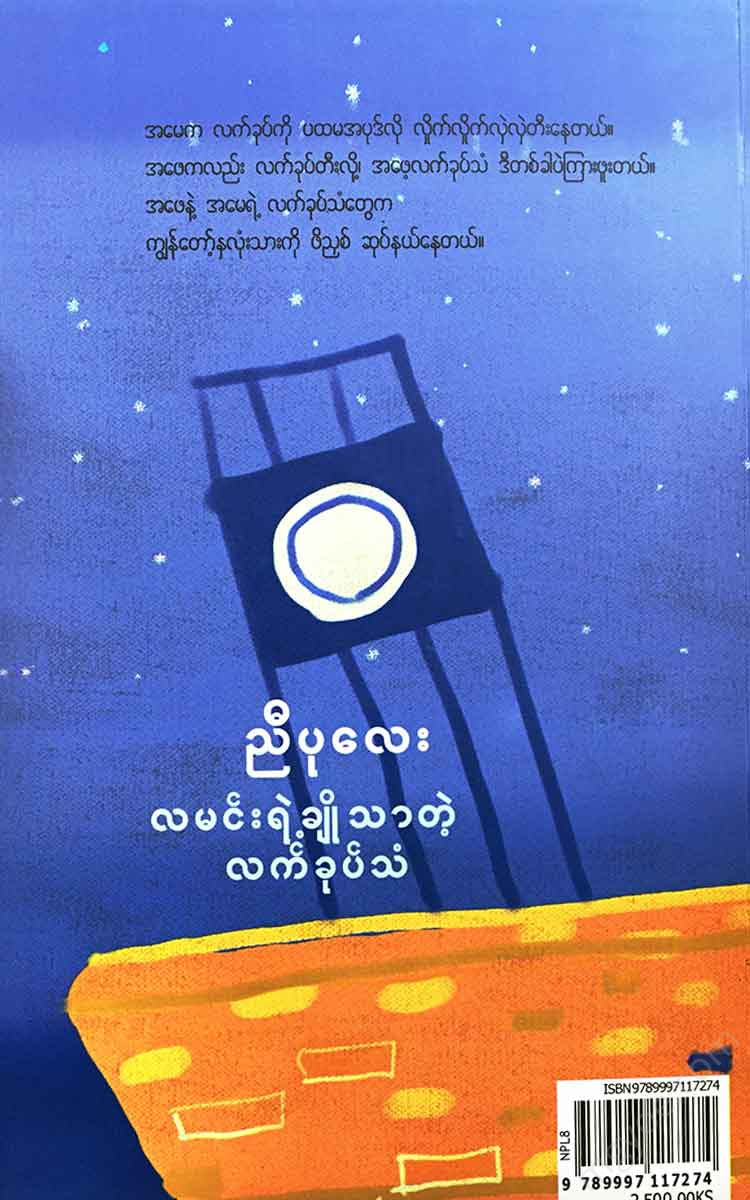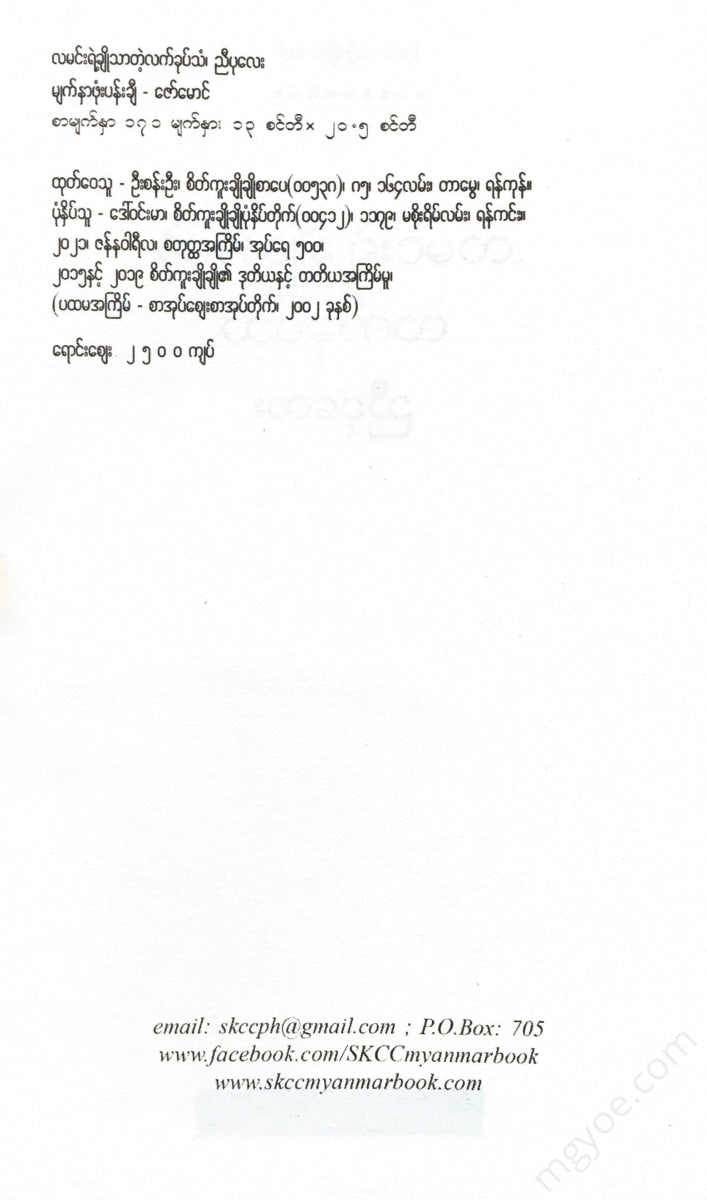စိတ်ကူးချိုချိုစာပေ
Nyi Pu Lay - The sweet sound of the moon's clapping hands
Nyi Pu Lay - The sweet sound of the moon's clapping hands
Couldn't load pickup availability
I have been writing short stories in the magazine Sampae Phyu since 1985. Some of my good friends criticized my stories for being too fragrant and smelling of tobacco and cigars. They criticized me with the intention of wanting me to write stories that reflected the contemporary feelings of the people of that era.
I've been thinking about this. Is it because my age and my novels are older? Is that a problem? My friends also point out and say what they want to read, what they want to be.
I was arrested on December 25, 1990. In short, I spent one night in Mandalay for interrogation, and two nights in Rangoon for interrogation. Then I was sent to Insein Joint Prison, and in early April 1991, I was sentenced. I was sent to Insein Main Prison. I was kept in Ward 3. On the evening of my arrival in Ward 3, the young students who had been imprisoned under Section 5(N) earlier, set up a waiting area and guarded me.
Among the people who looked after me were not only the students but also U Lay U Ohn Myint (Thakin Ohn Myint, Kyaw Lin Sae Pyi). U Lay U Ohn Myint and my parents were like brothers and sisters, right?
He often calls my parents "brother, sister, and mother." So he keeps them close to his family. There are tens of thousands of prisoners in Insein Prison. For this reason, there is not enough water, and the water is dry. It is possible that the water is deliberately dried up and the prisoners are not happy.
Uncle Ohn Myint taught us to eat together. We had to wash the bowls and plates twice a day, one by one, morning and evening. Zun Moe, the protagonist of the book “The Sweet Applause of the Moon,” and I became friends with Uncle Lay at the dining hall (Insein Prison 3). Zun Moe and the young men here were good at other things, but few people wanted to work with him when it came to washing dishes. They thought he was not good at washing dishes, and they thought he might get dirty. There was no soap and water in prison. So Zun Moe was not very guilty. But the prison was Insein Prison, where diseases were rampant. There were complications if the dishes were not clean.
Zun Moe, who was less willing to work with me, was accompanied by U Lay U Ohn Myint. When Zun Moe and I worked together to carry out the tasks of those who ate together, it surprised those who came. Zun Moe changed his personality. I thought of him as my younger brother, and he treated me like a brother. That's how I became close to him. As I got closer, I felt like I was reading a novel about him. How close we were, we even showed him a photo of his girlfriend, "Tati Poe," who was left outside. His young life, including how he got his girlfriend's photo into prison, how much he loved Tati Poe, etc., is quite interesting.
The room I was in at Insein Prison 3 was different from the room Zun Moe was in. The fields where we were assigned were also different. He and I only met during lunch and breaks. We talked about this story mostly during lunch and nap time. It was the time when the prisoners in Dipyin Prison rested and slept after working hard, so we talked and listened to each other in places like Baya Tan and the Buddha Lay Pariwun. As we talked, a young man named “Yin Htwe,” who was imprisoned for storming the Dala Police Station during the 1988 Uprising, was also there. He was also interested in the story Zun Moe was telling. He was also a good guitar player. I am not a good musician.
There were people more interested in the conversation between the three of us (about June Moe) than we were. They were the prison authorities. The prison guards who ran the three prisons. What were the three prisoners doing talking non-stop during their afternoon nap? Were they planning to riot, or were they breaking prison rules? At this time, the guards and guards came in, both subtly and visibly, to investigate. They listened. They didn’t go out of their way to guess.
When June Moe talks, he sings songs and the sound of the bass guitar, "Du... Du
Among us, Yin Htwe, who was listening with interest, would pat my thigh and encourage me to write about this. I asked Zun Moe for permission to write. I promised Yin Htwe.
When we are released from prison, we will meet again. Then, I will tell this story again and write it down. Maung Yin will edit it himself. Maung Yin will also fill in the things that I have forgotten. Soon after this agreement, Zun Moe, Yin Htwe, and I had to part ways. I was transferred to Thayet Prison first. Yin Htwe was transferred to Taungoo Prison. News came to Thayet Prison that Zun Moe was transferred to Tharyawaddy Prison.
June Moe was released first because he had served less time in prison than me. He was released not long after. The sad news reached the prison bell, ringing loudly. June Moe was found dead. It felt like hearing the sad news of a brother's death. When he was found dead, I made a stronger decision to write about him.
I returned home in 1999. As a gift from prison, I had the sweet sound of the moon’s hand in my mind. To do this, I often repeated this verse to the young people living in the Thayet Prison dormitory and the monks living in the monks’ house. That’s how I was able to draw the June Rain. It was only when there were no more than five prisoners in the dormitory that I could draw the lines with nostalgia. “The Sweet Sound of the Moon” was first published in 2002 by Book Market Bookstore, No. 57, 9th Street, Lanmadaw Township, Yangon, Tel. 222121, in a first edition of 500 copies. The selling price is 500 kyats. Now, the second edition is published by Imagination Cho Cho.
As I write these lines, I picture June Moe in my mind and recall my time in prison. I also remember the comrades and friends I spent time with. I especially remember the gratitude of the comrades and friends I spent time with, including U Lay Ohn Myint, the readers, and the publishers.
Little brother





